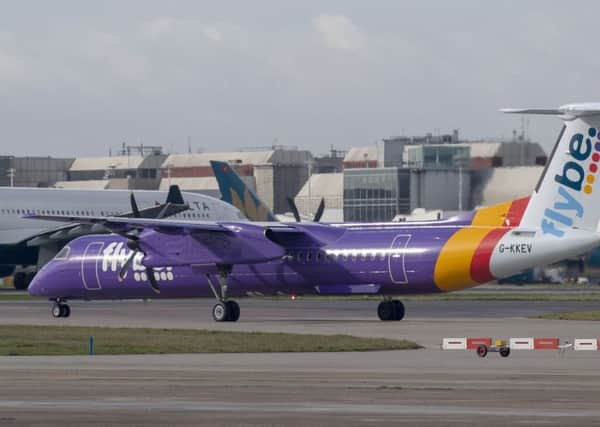The key questions to answer in Flybe affair – Bill Jamieson


Hooray for the Flybe ‘rescue’. Like many Scots, I am a frequent FlyBe flyer on domestic routes across Scotland and the UK. So I am mightily relieved over the news that the UK Government will review the application of Air Passenger Duty and that the companies that assisted the airline with funds last year have said they will chip in more to the pot.
However, there are aspects of the Flybe crisis and proposed solution that concern me. First, how did a financial rescue package unveiled only a year ago for Europe’s largest regional airline prove to be inadequate so quickly?
Advertisement
Hide AdAdvertisement
Hide AdVirgin Atlantic, the Stobart Group and Cyrus Capital Partners effectively took control for £2.2 million a year ago and agreed to inject £100 million to keep the business afloat. What happened to that money? And what did the backers get in return?
Now they have been told they would be required to inject “tens of millions of pounds” in fresh equity as a condition of the latest deal with the Government.
What has been the role of the Government’s Air Passenger Duty in the Flybe debacle? The airline has been allowed to run up a tax bill of £106 million – money paid for by passengers in APD but which has not as yet been passed to the Government. Talks were held with Cabinet ministers this week on deferring this payment until 2023.
‘Misuse of public funds’
But the proposed deal has run into criticism. Green Party MP Caroline Lucas has attacked the deal as a betrayal of pledges to cut carbon emissions. “Domestic flights”, she declared, “need to be reduced, not made cheaper”.
Meanwhile Willie Walsh, outgoing chief executive of the British Airways and Iberia owner International Airlines Group, has branded it a “misuse of public funds”.
Others have pointed to Government hypocrisy in bailing out the firm in the name of “regional connectivity” while allowing Monarch Airlines and Thomas Cook to go under – a lamentable example of state intervention to prop up business failure. But this critique glosses over the role of governments – Conservative and Labour – in undermining airline finances, in particular regional operators.
It was a Tory chancellor Kenneth Clarke who first introduced APD in 1994 – a £5 surcharge. Since then it has been used as a near-invisible stealth tax. It was doubled in February 2007 to £10, raised again to £11 in November 2009, hiked further to £12 in 2010 and yet again to £13 in April 2012.
APD now raises around £3.8 billion every year and is the highest in Europe. It is roughly three times more expensive than the rate charged in France and twice as much as Germany currently taxes. The highest rate, on first-class long-haul flights, can be up to £528.
Greta Thunberg’s ‘flight shaming’
Advertisement
Hide AdAdvertisement
Hide AdThe Government has for years resisted calls to scrap APD on domestic flights, leading to complex exemptions in Northern Ireland and the Highlands and Islands, and the introduction of taxpayer-underwritten PSO (public service obligation) routes. At Holyrood, attempts to introduce a devolved version became mired in difficulty.
Why UK ministers should now decide to tinker with APD, having separately agreed a special favour to Flybe through its tax remittance, is a mystery.
If the Government is serious about APD reform, it must review the entire mechanism.
A couple with two children aged 16, flying from Edinburgh to Alicante pays £52 in APD (£104 if they avail of such obscene luxuries as premium economy with extra legroom). If they choose Orlando, the tax rises to £312 for the most basic economy trip, and £688 for premium economy.
There is no distinction between domestic air travel and European flights, nor between time of day or place of departure. A health worker flying from Aberdeen to Cardiff pays the same tax as a member of a stag party flying from Glasgow to Prague.
If governments are serious about harnessing the power of Greta Thunberg’s ‘flight shaming’ and using APD as a sin tax, there needs to be a closer relationship between the payable rate and the sin. At present, there is little consideration of fuel efficiency, or whether the land alternative is any less polluting.
There is also a perverse incentive whereby a transatlantic business class ticket from Brussels or Dublin via London is not taxed (and thus several hundred pounds cheaper) than a ticket for the same flight departing from London. Want to save money and avoid the environmental tax? Simply take even more flights!
In Scotland there have been numerous attempts to reduce or abolish APD. Liz Cameron, chief executive of the Scottish Chamber of Commerce, has urged the Scottish Government this week “to help prevent the collapse of a key mode of transport for Scots and to save jobs”. Quite right: reform must go further than a payment deferral for Flybe.